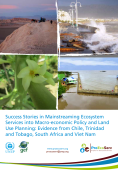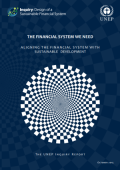
The 'ProEcoServe' project assessed ecosystem services such as the provision of soil retention, shoreline protection, carbon sequestration and pollination, identifying almost US$1 billion of benefits in the four pilot countries of Chile, Trinidad and Tobago, South Africa and Viet Nam. This final report includes the results of a four-year project to develop ecosystem assessment tools and products that decision makers can use to integrate the value of ecosystem services into policy, investment decisions and macro-economic models.

This report addresses investment in sustainable urban infrastructure and provides an overview of financial instruments that are commonly used to finance infrastructure development. It analyses their potential to support the transition towards sustainable infrastructure, with a primary focus on energy efficiency and renewable energy at city level. Cities are faced with the huge challenge of providing infrastructure that meets the needs of a rising urban population with limited public resources. Cities already account for over 70% of global greenhouse gas emissions and energy consumption and face rising climate change-related risks. The way cities develop, particularly large and fast-growing cities in developing and emerging economies, is likely to have profound and long-term implications for both climate change and the global economy. Decisions and investments in urban infrastructure must be leveraged to achieve sustainable economic growth within the carrying capacity of the planet’s systems and resources.
This book identifies the drivers and success factors of green industrial policy, which seeks to reconcile the synergies and trade-offs which exist between economic and environmental goals. Greening the economy is a goal which will require enormous investment. As markets are currently failing to provide the required incentives for environmental sustainability, governments must intervene and provide ‘policy rents’ for investments in sustainability while withdrawing rents from polluting investments. In this they will face the risk of political capture by interest groups and difficult choices among technologies. Rent management is therefore the heart of green industrial policy and the focus of this book. On top of this, the country examples provided in this volume focus on the emerging powers, which will have an important influence on the future of our planet.
Countries in Sub-Saharan Africa (SSA) have experienced dramatic economic growth in the past decade, with six of the ten fastest growing economies in the world found in SSA between 2000 and 2010. Economic growth is critical to continued development and poverty reduction, but can have, as has already become visible in the region, significant environmental costs and can even hinder further long term economic growth and development, if environmentally unsustainable growth paths are continued. However greener growth is needed to allow SSA countries to continue to develop, while avoiding or reducing negative environmental impacts.
